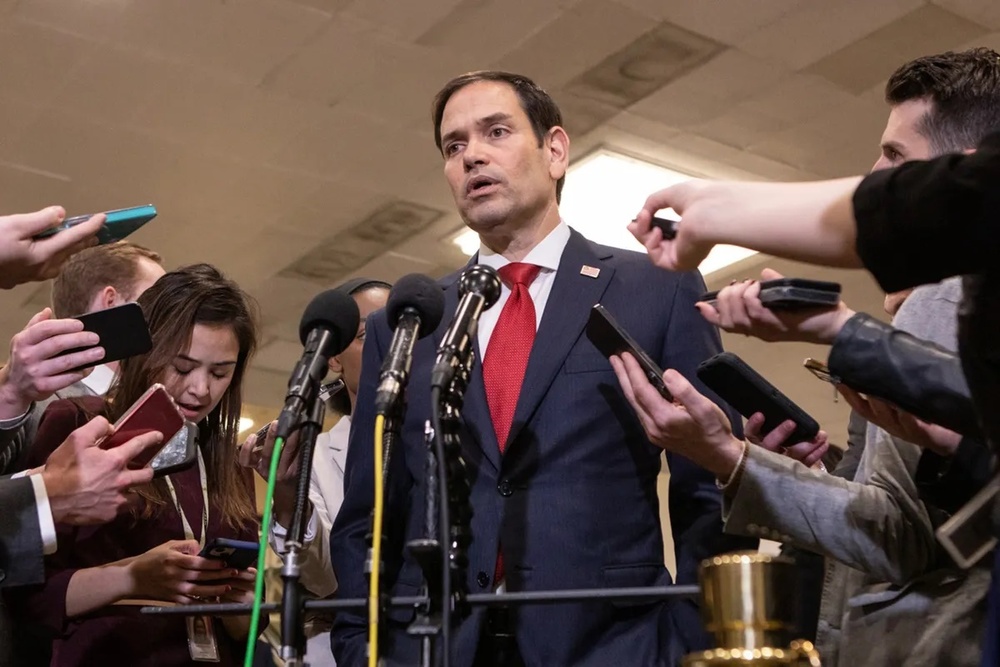
(Marco Rubio in 2023.Photographer: Anna Rose Layden/Bloomberg)
Last Thursday, one of the most remarkable changes in American foreign policy in decades went largely unnoticed due to the cascade of changes President Trump has made since his inauguration.
Since the end of World War II, mainstream American politicians from both sides of the aisle have held fast to the belief that the United States is the economic, military, and moral leader of the world—and that it should stay that way. But in a recent interview with Megyn Kelly, newly confirmed Secretary of State Marco Rubio declared with little fanfare that multipolarity is not only the norm, but a preference in the eyes of the Trump administration. Moreover, he proposed that we are currently living in a multipolar world, with the United States and China as the two main players. This is a shocking change in language and in tone of the American foreign policy paradigm, upending a bipartisan consensus spanning decades.
This is also a vast departure from the rhetoric that has, over the last five years, framed the competition with China as an ideological struggle between authoritarianism and democracy. Rubio claimed that multipolarity is “not an abandonment of our principles…[but] foreign policy has always required us to work in the national interest, sometimes in cooperation with people who we wouldn’t invite over for dinner or people who we wouldn’t necessarily ever want to be led by.”
This is not an aberration or a slip of the tongue by Rubio. The day after his interview, he published an op-ed in the Wall Street Journal that further lays out this “approach to foreign policy based on concrete shared interests, not vague platitudes or utopian ideologies.”
His rhetoric may seem to echo that of Chinese leaders calling for mutually beneficial cooperation in areas of shared interest. But Rubio’s multipolar world is a different beast altogether from the multipolar world that China envisions. Rather than the outlined “equal rights, equal opportunities, and equal rules for every nation… [and] cooperation under global governance,” Rubio’s multipolarity is not a cooperative one—rather, it is the foreign policy of “America First.”
Multipolarity to Rubio means that “The Chinese will do what’s in the best interests of China… and the United States needs to do what’s in the best interest of the United States.” It is an abdication of the U.S.’ previously self-assumed responsibility for the rest of the world. It also disputes that a multipolar world would be good for China—rather, it is anchored in the idea that current world order is “a weapon being used against [the U.S.]” by China. In a multipolar world, Rubio argues, the U.S. can finally prioritize its national interests rather than focusing on upholding the U.S.-led “liberal world order.”
This foreign policy paradigm has a strong base of support among Trump’s advisors. Trump has filled his policy team with China hawks, but the majority are not anti-China ideologues. Deputy National Security Adviser Alex Wong, for example, wrote last year that U.S.-China competition arises from an irreconcilable systemic incompatibility between the Chinese and American systems. But rather than presenting this difference through the ideological and moral lens of “democracy vs. authoritarianism,” he frames this incompatibility as unacceptable to the United States from an interests-based point of view.
Vitally, adopting an interests-based foreign policy in a multipolar world is not inherently less hawkish than pursuing an ideological strategy. In the same interview with Kelly, Rubio said that “China wants to be the most powerful country in the world and they want to do so at our expense, and that’s not in our national interest, and we’re going to address it.” Wong similarly predicts “a level of tension, regional destabilization, and—yes—possible conflict that we have not seen since the end of World War II.”
Yet, interest-based conflicts, while still aggressive, are often more manageable than ideological ones because they are rooted in tangible, negotiable issues rather than abstract, deeply entrenched beliefs. This could lead to more transactional diplomacy, where agreements are made on a case-by-case basis.
It has been barely two weeks since President Trump took office—the longevity of his current foreign policy paradigm is unknown. However, if the Trump administration continues down this path, the implications for global geopolitics could be profound. A shift from ideological to interests-based foreign policy and from a position of dominance to a reactionary one will redefine international alliances, reshape economic partnerships, and alter the nature of global conflicts. The coming months and years will reveal whether this radical reorientation of U.S. foreign policy will stand the test of time or be relegated to a brief, tumultuous chapter in the history of American diplomacy.